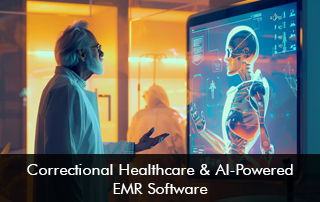The integration of Artificial Intelligence (AI) with Electronic Medical Records (EMR) software is revolutionizing various sectors, and correctional healthcare is no exception. Correctional facilities face unique challenges in providing healthcare to inmates, and AI-powered EMR software offers innovative solutions to enhance patient care, streamline operations, and improve outcomes.
Current Challenges in Correctional Healthcare
-
Limited Resources:
- Overcrowded facilities strain medical resources.
- Shortage of healthcare professionals leading to high patient-to-doctor ratios.
-
Complex Health Needs:
- High prevalence of chronic diseases, mental health issues, and substance abuse disorders.
- Need for continuous care and management of various conditions.
-
Operational Inefficiencies:
- Paper-based records and outdated systems causing delays and errors.
- Difficulty in tracking and managing patient histories and treatments.
Introduction to EMR Software in Correctional Facilities
-
Digitization of Records:
- Transition from paper-based to digital records for better data management.
- Centralized database for easy access to patient information.
-
Streamlined Workflows:
- Automation of administrative tasks reducing the burden on medical staff.
- Enhanced coordination between different departments within the facility.
Enhancing EMR Functionalities with AI
-
Predictive Analytics:
- AI algorithms analyze historical data to predict potential health issues.
- Early identification of high-risk inmates for timely interventions.
-
Automated Alerts and Reminders:
- Reminders for medication, follow-up appointments, and routine check-ups.
- Alerts for abnormal test results or critical changes in health status.
-
Natural Language Processing (NLP):
- Efficient extraction and analysis of information from unstructured data (e.g., doctor’s notes).
- Improved accuracy in diagnosing and documenting medical conditions.
Case Studies of Successful AI Implementations
-
Reducing Hospital Admissions:
- AI-driven risk assessments reducing unnecessary hospital visits.
- Case study from a facility showing a significant drop in emergency admissions.
-
Enhanced Chronic Disease Management:
- AI tools providing personalized treatment plans for chronic conditions.
- Improved health outcomes in inmates with diabetes and hypertension.
Impact on Patient Outcomes and Medical Staff Efficiency
-
Improved Patient Care:
- Faster and more accurate diagnosis and treatment.
- Higher adherence to treatment plans through automated monitoring and reminders.
-
Efficiency for Medical Staff:
- Reduced administrative workload allowing more focus on patient care.
- Enhanced decision-making with data-driven insights and recommendations.
Potential Risks and Ethical Considerations
-
Data Privacy and Security:
- Ensuring robust security measures to protect sensitive health data.
- Compliance with regulations like HIPAA.
-
Bias and Fairness:
- Addressing potential biases in AI algorithms to ensure equitable care.
- Ongoing monitoring and adjustment of AI models to mitigate bias.
Future Prospects and Ongoing Research
-
AI Innovations:
- Development of more sophisticated predictive models and decision-support systems.
- Integration with other emerging technologies like telemedicine and wearable health devices.
-
Ongoing Research:
- Continuous evaluation of AI’s impact on health outcomes and operational efficiency.
- Collaborative research efforts to further enhance AI applications in correctional healthcare.
AI-powered EMR software system holds significant promise for transforming correctional healthcare. By addressing the unique challenges faced by correctional facilities, AI can enhance patient care, improve operational efficiency, and ultimately contribute to better health outcomes for inmates. As technology continues to evolve, the potential for AI to further revolutionize correctional healthcare is immense, paving the way for a more efficient and effective healthcare system within correctional settings.







